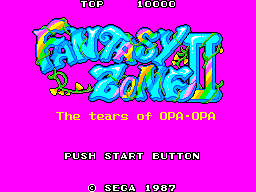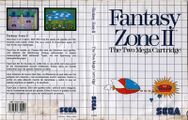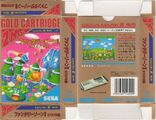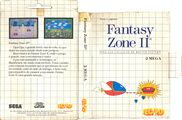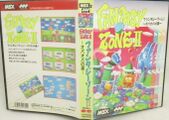Difference between revisions of "Fantasy Zone II: The Tears of Opa-Opa"
From Sega Retro
Scarred Sun (talk | contribs) |
|||
| Line 41: | Line 41: | ||
Aside from this the game is much the same as before - the player controls Opa-Opa and must destroy "bases" littered throughout the level. When all the bases are destroyed, a boss will appear, and defeating the boss will allow the user to progress to the next level. The Japanese Master System version is compatible with the [[FM Sound Unit]]. | Aside from this the game is much the same as before - the player controls Opa-Opa and must destroy "bases" littered throughout the level. When all the bases are destroyed, a boss will appear, and defeating the boss will allow the user to progress to the next level. The Japanese Master System version is compatible with the [[FM Sound Unit]]. | ||
| − | == | + | ==History== |
| + | ===Legacy=== | ||
Following the release of the Master System version, Sega brought ''Fantasy Zone II'' to the [[Sega System E]] arcade platform, whose internals are almost identical to Sega's home console. The System E version replaces the power meter with a radar, though is the only port to do so. [[Pony Canyon]] brought the game to MSX computers and [[SunSoft]] released a copy for the Nintendo Famicom. Both home ports take a hit in terms of graphics and sound, and the MSX version has choppier scrolling. Sunsoft's port was renamed '''''Fantasy Zone 2: The Teardrop of Opa-Opa'''''. | Following the release of the Master System version, Sega brought ''Fantasy Zone II'' to the [[Sega System E]] arcade platform, whose internals are almost identical to Sega's home console. The System E version replaces the power meter with a radar, though is the only port to do so. [[Pony Canyon]] brought the game to MSX computers and [[SunSoft]] released a copy for the Nintendo Famicom. Both home ports take a hit in terms of graphics and sound, and the MSX version has choppier scrolling. Sunsoft's port was renamed '''''Fantasy Zone 2: The Teardrop of Opa-Opa'''''. | ||
| Line 47: | Line 48: | ||
The Master System version of the game has since been re-released through the [[Wii]]'s [[Virtual Console]] service. | The Master System version of the game has since been re-released through the [[Wii]]'s [[Virtual Console]] service. | ||
| + | |||
| + | ==Production Credits== | ||
| + | ===Master System Version=== | ||
| + | *[[Rieko Kodama]] | ||
==Physical Scans== | ==Physical Scans== | ||
Revision as of 06:16, 15 November 2013
| Fantasy Zone II: The Tears of Opa-Opa | |||||||||
|---|---|---|---|---|---|---|---|---|---|
| System(s): Sega Master System, Sega System E, Famicom, MSX, Virtual Console | |||||||||
| Publisher: Sega, Sunsoft, Pony Canyon | |||||||||
| Developer: Sega, Sanritsu, Atelier Double | |||||||||
| Genre: Shoot-'em-Up | |||||||||
| |||||||||
|
CERO
Missing Parameter! |
Fantasy Zone II: The Tears of Opa-Opa (ファンタジーゾーンII オパオパの涙) is the direct sequel to Fantasy Zone, initially released for the Sega Master System in 1987.
Fantasy Zone II is very similar to the original game, however makes a few important changes. Levels are now split up into sections, which can be travelled to and from via warp gates. Unfortunately the game lacks a radar, which makes navigating the levels more difficult than in its predecessor. It is also possible to visit the shop at any time, rather than relying on a balloon to appear.
Aside from this the game is much the same as before - the player controls Opa-Opa and must destroy "bases" littered throughout the level. When all the bases are destroyed, a boss will appear, and defeating the boss will allow the user to progress to the next level. The Japanese Master System version is compatible with the FM Sound Unit.
Contents
History
Legacy
Following the release of the Master System version, Sega brought Fantasy Zone II to the Sega System E arcade platform, whose internals are almost identical to Sega's home console. The System E version replaces the power meter with a radar, though is the only port to do so. Pony Canyon brought the game to MSX computers and SunSoft released a copy for the Nintendo Famicom. Both home ports take a hit in terms of graphics and sound, and the MSX version has choppier scrolling. Sunsoft's port was renamed Fantasy Zone 2: The Teardrop of Opa-Opa.
In 2008 the game was re-released in volume 33 of the Sega Ages 2500 PlayStation 2 series in Japan, along with all the other main entries in the Fantasy Zone series. This collection is notable for the inclusion of Fantasy Zone II DX: The Tears of Opa-Opa, a "port" of the game to Sega System 16 arcade hardware.
The Master System version of the game has since been re-released through the Wii's Virtual Console service.
Production Credits
Master System Version
Physical Scans
Master System Version
| Sega Retro Average | ||||||||||||||||||||||||||||||||||||||||||||||||||||||
|---|---|---|---|---|---|---|---|---|---|---|---|---|---|---|---|---|---|---|---|---|---|---|---|---|---|---|---|---|---|---|---|---|---|---|---|---|---|---|---|---|---|---|---|---|---|---|---|---|---|---|---|---|---|---|
|
| 85 | |
|---|---|
| Based on 10 reviews | |
| Master System, KR |
|---|
|
System E Version
NES Version
MSX Version
External Links
- ↑ Complete Guide to Consoles, "" (UK; 1989-10-16), page 55
- ↑ Complete Guide to Consoles, "Volume IV" (UK; 1990-11-xx), page 96
- ↑ The Complete Guide to Sega, "" (UK; 1991-05-xx), page 56
- ↑ Console XS, "June/July 1992" (UK; 1992-04-23), page 140
- ↑ Mean Machines Sega, "October 1992" (UK; 1992-09-xx), page 133
- ↑ Power Play, "Ausgabe 3" (DE; 1988-02-22), page 92
- ↑ Sega Power, "October 1991" (UK; 1991-09-05), page 56
- ↑ Sega Pro, "Christmas 1991" (UK; 1991-12-12), page 18
- ↑ Sega Pro, "April 1993" (UK; 1993-03-11), page 70
- ↑ Tilt, "Mai 1988" (FR; 1988-0x-xx), page 101
